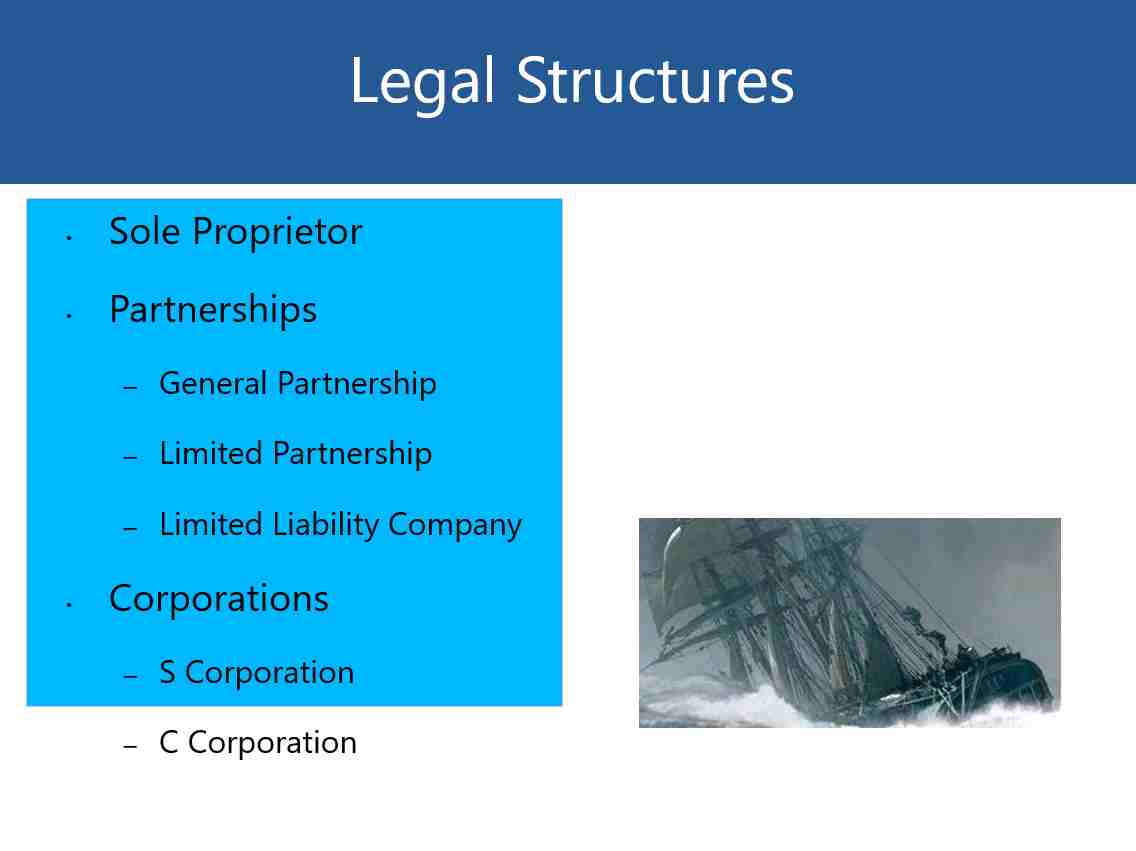Enjoy the following excerpt from my FREE What You Need to Know About Starting a Business course where I talk about taxes as it relates to legal entities. We also talk about ways to pitch high-net-worth investors to invest in your startup.
Video Transcript (lightly edited for clarity)

Legal structures, everything in blue is what we call pass-through entities. What that means is that the entity itself does not pay taxes and the profit that the company may create gets recorded on a tax return. And that tax return. if there are multiple owners of that company, it will issue what we call K1s.
So, let’s say you have a company and there’s $100,000 worth of business and it makes $10,000 worth of profit after all expenses. Say we’re 50% owners. I get a K1 for $5,000 and you get a K1 for $5,000. Does the company have to pay me that $5,000? No. I’m obligated to pay taxes because the company made money. The company can do a “distribution” and give me that $5,000 or they can give me $1,000 which might cover my tax nut and keep the other $4,000 for me to roll back into the business to buy more inventory, to scale, or whatever the case. Just like any stock-based company, they’re not obligated to pay that money {Profit] to the investors but you as an individual are obligated to pay the taxes on the money that you didn’t receive. This is very similar to what happens in the stock market today.
When you own stock and stock appreciation causes the value to go up, you made some money but they [the business] reinvested it but now you have a tax consequence for owning some stock, but you never saw the cash.
So typically what we do in small businesses is we figure out what the worst-case tax nut is. We then do that as a distribution to the individuals so they’re not out of cash and then we will carry the back of the remaining portion. We call that retained earnings and then we use that to help grow the business.
C-Corps are the only ones that are ultimately going to be taxed as a separate entity. In many cases, the C-Corp is being taxed at a lower rate than a high-net-worth individual would be. Now you have to remember at some point high net worth individuals paid 70 something percent on their income. So, every dollar they brought in. 70 something cents went back to the government in taxes. Today it’s not quite that high but in many cases, you got to keep aware of where the tax dollars are going and what your tax rate is.
If I’m a high-net-worth individual that dollar that comes to me through a pass-through entity, more of that goes out as taxes than somebody who is in a lower bracket. Somebody might be in a let’s say a 15% tax federal bracket and you’re a high-net-worth investor it might be in a 30% federal tax bracket. So that high-net-worth investor will keep 70 cents out of that dollar and has to pay 30 cents to Uncle Sam, where you may be in a 15 bracket you get to keep 85 cents of that since only 15 cents goes to Uncle Sam.
So you can see pass-thru entities are good for kind of low-income investors, but when you start dealing with high-net-worth investors maybe that’s not the way they want to go.
But, early on in the business, the business loses money sometimes. Well, that high-net-worth investor might want to take that loss [to offset their other gains]. By the way, when I’m a limited liability company or above I don’t issue shares of stock I can divvy up that as much as I want. So I might say:
“Mr. high-net-worth investor, give me some money, and here’s what we’re gonna do. For every penny that the business loses you get to claim that loss because I don’t really need the loss. But you do. So I want you to be an early-stage investor in my business because we’re not gonna make money for a year and you’re gonna have a huge tax write-off that’s going to go to you. But in a year from now, the value of this company is going to be much better than it is now and then you can sell your stake to somebody else who’s in it for the cash flow. So why don’t you just take advantage of the negative cash flow that we have, it’s no cost to you at this point, you’ve made the investment and you get to claim that loss, Then you sell it at a higher price [when we are profitable].”
See how that becomes a viable messaging for an investor that’s going to go in in the early-stage investment because they get to take that write-off.
Do they get to do that when they invest in the stock market? No. You see what I’m getting toward. everybody knows somebody who’s willing to be an investor in a particular business.
And the C-Corp at the end, the dividends that that C Corp pays are taxed at capital gains taxes. 15% that’s a whole lot less. So if I’m a high-net-worth investor and I’m investing in the C Corp I’d rather take those distributions that cost me 15% [in taxes] than the 30%,
Related Post: 39 Considerations When Choosing The Best Business Entity









